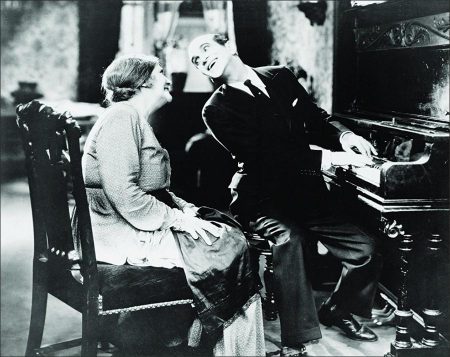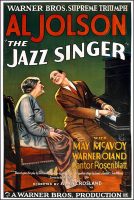Tagline: Hear him sing Mammy, Toot Toot Tootsie, My Gal Sal, Mother I Still Have You.
The Jazz Singer movie storyline. Legendary, revolutionary film, known as the first sound motion picture – literally, the first feature film to utilize Synchronous Sound. In actuality, it was a part-talkie with only a few musical sequences and one ad-libbed, conversational sequence. With Al Jolson in his film debut. Precipitating a split with his cantor father (Oland) and mother (Besserer), young Jewish son Jakie Rabinowitz (Jolson) leaves his home, takes a new name – Jack Robin – and enters show business as a Broadway singer of popular/secular music.
When his father falls ill on Yom Kippur, Jakie takes his father’s place in the synagogue and performs the Kol Nidre. Contains the classic line: “You ain’t heard nothin’ yet!” Tunes include “My Mammy,” “Dirty Hands, Dirty Face,” “Toot, Toot, Tootsie Goodbye” and “Blue Skies.” Academy Award Nominations: 2, including Best Adapted Writing, Best Engineering Effects. Special Award to “Warner Bros., for producing… the pioneer outstanding talking picture, which has revolutionized the industry.”
The Jazz Singer is a 1927 American musical film. As the first feature-length motion picture with not only a synchronized recorded music score, but also lip-synchronous singing and speech in several isolated sequences, its release heralded the commercial ascendance of sound films and ended the silent film era. Directed by Alan Crosland and produced by Warner Bros. with its Vitaphone sound-on-disc system, the film, featuring six songs performed by Al Jolson, is based on a play of the same name by Samson Raphaelson, adapted from one of his short stories, “The Day of Atonement”.
The film depicts the fictional story of Jakie Rabinowitz, a young man who defies the traditions of his devout Jewish family. After singing popular tunes in a beer garden he is punished by his father, a hazzan (cantor), prompting Jakie to run away from home. Some years later, now calling himself Jack Robin, he has become a talented jazz singer. He attempts to build a career as an entertainer but his professional ambitions ultimately come into conflict with the demands of his home and heritage.
Darryl F. Zanuck won an Honorary Academy Award for producing the film; Alfred A. Cohn was nominated for Best Writing (Adaptation) at the 1st Academy Awards. In 1996, The Jazz Singer was selected for preservation in the National Film Registry of “culturally, historically or aesthetically significant” motion pictures. In 1998, the film was chosen in voting conducted by the American Film Institute as one of the best American films of all time, ranking at number ninety.
The Jazz Singer (1927)
Directed by: Alan Crosland
Starring: Al Jolson, May McAvoy, Warner Oland, Eugenie Besserer, Otto Lederer, Robert Gordon, Richard Tucker, Yossele Rosenblatt. Jane Arden, Ernest Belcher, Violet Bird, Claire Delmar
Screenplay by: Alfred A. Cohn
Cinematography by: Hal Mohr
Film Editing by: Harold McCord
Special Effects by: Nugent Slaughter
Music by: Louis Silvers
Distributed by: Warner Bros. Pictures
Release Date: October 6, 1927
Views: 405

